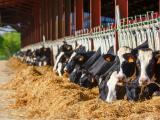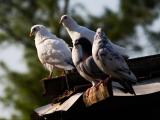Jan 20, 2012 (CIDRAP News) – Eighteen virologists have sent a letter to the US government's dual-use research advisory board, asking members to reconsider their recommendation that two research groups redact key details about their studies on mutated H5N1 viruses.
The letter, sent to the National Science Advisory Board for Biosecurity (NSABB) on Jan 18, was signed by virologists from US universities, according to a report today from ScienceInsider, the online news service of Science. The NSABB made its ruling last month based on concerns about an intentional or accidental release of the viruses.
On Dec 20, the US government asked two journals, Science and Nature, to omit key details of two studies on the transmissibility of mutant H5N1 strains, based on the recommendation of the NSABB, a panel of independent experts that advises the National Institutes of Health (NIH) on dual-use research issues. Both studies were conducted under NIH contracts.
The journals responded cautiously to the recommendation and are waiting for the government to come up with a mechanism to share key details with researchers who have a legitimate need for them. The NSABB's recommendation has been criticized as a threat to scientific freedom, though other experts have supported the board's stance.
The letter was signed by some virologists who have previously criticized the NSABB's recommendation, including some among an international list of scientists who today signed on to a voluntary 60-day H5N1 research moratorium, such as Dr Peter Palese and Dr Adolfo Garcia-Sastre, with Mount Sinai School of Medicine in New York (see related CIDRAP News story).
The letter to the NSABB from the virologists argues that fears about the mutant virus falling into the wrong hands or escaping during a lab accident are overblown, ScienceInsider reported.
The letter writers say there is no evidence that the mutated strains would sicken humans, except if large doses were inhaled, the report said. The virologists also took issue with estimates of how lethal the H5N1 virus is and said the number of human infections is not known and could be higher than previously thought.
They maintained that current safety oversight is adequate, and that the studies should proceed. Writers urged the NSABB to consider broad discussion in the science community before taking final action.
See also:
Jan 20 ScienceInsider story
Jan 20 CIDRAP News story "Researchers announce pause in controversial H5N1 studies"
Dec 20, 2011, CIDRAP News story "US government urges journals to omit details of two H5N1 studies"



















